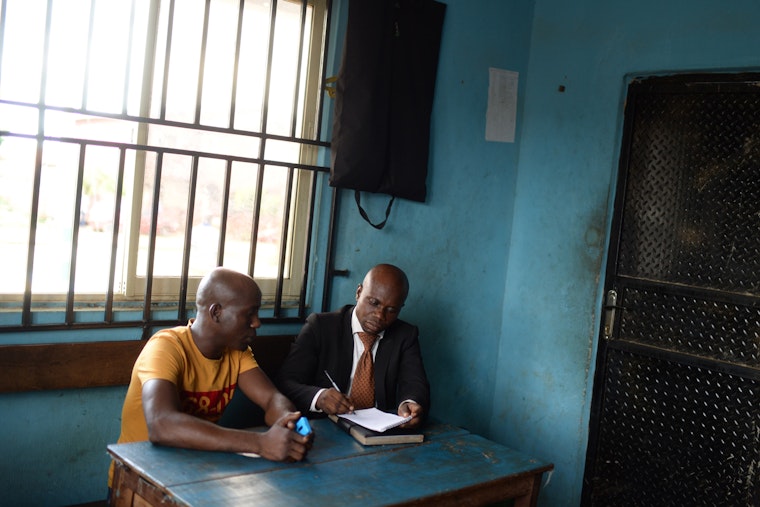Nigeria’s Legal Aid Lawyers Win Police Recognition
By Stanley Ibe

It all started in 2005, when 16 newly qualified Nigerian lawyers started visiting detainees held in police stations as part of their compulsory national service under the auspices of the Legal Aid Council of Nigeria. Their mission: to offer free legal advice to suspects within 48 hours of an arrest.
Perhaps the lawyers could ensure a suspect’s timely release, if there was no basis for charges. Perhaps they could ensure the release of nonviolent offenders, pending a later trial. Perhaps they could reduce the number of people held in pretrial detention in Nigeria, where more than two-thirds of the prisoners in the country’s overcrowded jails are there awaiting trial. Some end up being held for years, even on relatively minor charges.
Twelve years later, scores of young lawyers have taken part in what became known as the Police Duty Solicitors Scheme. Over 15,000 suspects have successfully been kept out of unnecessary pretrial detention. From just four states initially (Imo, Kaduna, Ondo, and Sokoto), the scheme had been expanded to seven, adding Edo, Kebbi, and Nasarawa.
Now it’s poised to expand nationwide. Nigeria’s most senior police officer, Inspector General Ibrahim Kpotu Idris, announced on September 20 that the provision of early legal aid through the duty solicitors was now recognized as part of police standard operating procedure.
At the ceremonies instituting the new order, IG Idris highlighted one benefit of the presence of lawyers at police stations, noting that police who are “often accused of torture and inhumane treatment … will now have an independent person” on hand, who could “act as a check to their excesses” and provide a vital witness when officers themselves were accused wrongly of abuse.
At the same time, he added, “the public, mainly the poor and the vulnerable arrested by the police for being in conflict with the law will not only have the services of a counsel … to ensure the protection of their rights, but at no cost.”
The new regulation, Force Order No. 20, means there is now a requirement to expand the provision of duty solicitor services across all 36 states and the Federal Capital Territory—a daunting but doable task. Conditions for regulating and reducing excessive pretrial detention are now much better than they were 12 years ago: the adoption of the groundbreaking Administration of Criminal Justice Act in 2015 means magistrates are now required to review remand orders on a periodic basis, reducing the chances that a suspect can fall into limbo in detention. The law also mandates regular reporting of pretrial numbers to supervising magistrates, introducing a new element of accountability.
The success of the scheme so far is also a tribute to the power of partnership between government and civil society in Nigeria (at a time when the contribution of civil society is regrettably under political attack from some Nigerian politicians). Originally, the Police Duty Solicitors Scheme was the result of partnership between the Nigeria Police Force, Nigeria’s Legal Aid Council, and the Open Society Justice Initiative, with the Rights Enforcement and Public Law Centre (REPLACE) acting as the implementing agency.
Getting the duty solicitor schemes into every state will again demand more than the cooperation of state governments and the national police force. Duty solicitors have to come from the ranks of lawyers, so the Nigerian Bar Association has a leadership role to play in galvanizing its members to embrace pro bono service. Legal services NGOs might also want to engage with the scheme. Beyond these individuals and institutions, there is a need to step up public communications on access to justice and the rights of arrested persons.
The scheme could benefit from a vigilant public. Abuses are bound to occur, but it should be possible to provide a framework within which these abuses can be reported and redressed. Thankfully, the Force Order creates an advisory committee which includes the police, the Legal Aid Council of Nigeria, the National Human Rights Commission, and the National Orientation Agency, as well as nonstate groups such as the Justice Initiative, REPLACE, and Nigerian Bar Association. The committee, which will meet quarterly, has a responsibility to “review, advize, and resolve any outstanding issues affecting the effective implementation of the scheme.”
The next 12 years promise to be more exciting than the last. As more states adopt Administration of Criminal Justice laws and commit themselves to the proper regulation of pretrial detention, it will become increasingly important to establish duty solicitor schemes. Best practices from states where the scheme has already been established will be in high demand.
We have seen what can be achieved, and we know what needs to be done to build a more humane and more just system.
Stanley Ibe is a legal officer for Africa at the Open Society Justice Initiative.